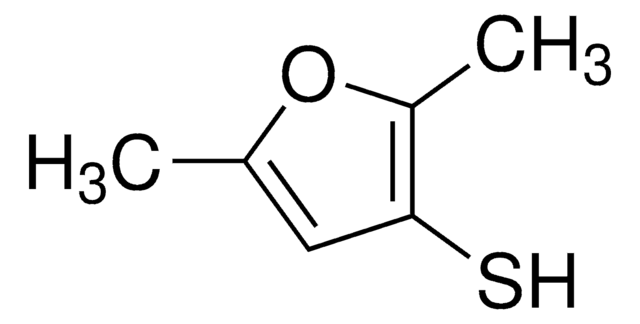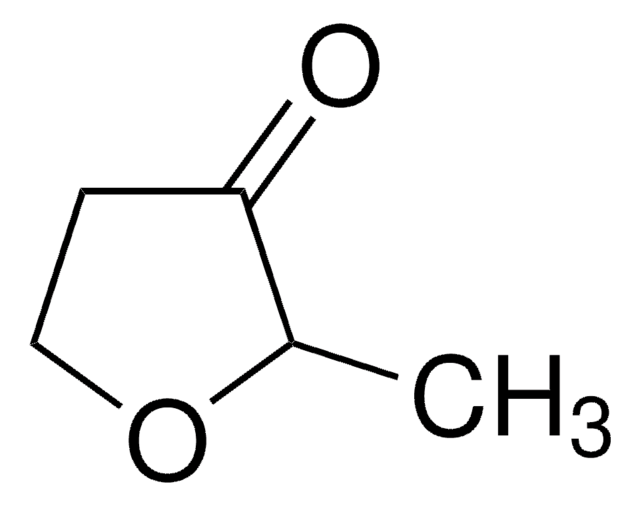W318809
2-Methyl-3-furanthiol
≥95%, FG
Synonyme(s) :
2-methyl-3-furyl mercaptan, Fish thiol, Oxy cyclothione-030
About This Item
Produits recommandés
Source biologique
synthetic
Niveau de qualité
Qualité
FG
Fragrance grade
Halal
Kosher
Agence
follows IFRA guidelines
Conformité réglementaire
EU Regulation 1223/2009
EU Regulation 1334/2008 & 178/2002
Densité de vapeur
>1 (vs air)
Pureté
≥95%
Indice de réfraction
n20/D 1.518 (lit.)
Point d'ébullition
57-60 °C/44 mmHg (lit.)
Densité
1.145 g/mL at 25 °C
Application(s)
flavors and fragrances
Documentation
see Safety & Documentation for available documents
Allergène alimentaire
no known allergens
Allergène de parfum
no known allergens
Propriétés organoleptiques
fishy; meaty; metallic; sulfurous
Chaîne SMILES
Cc1occc1S
InChI
1S/C5H6OS/c1-4-5(7)2-3-6-4/h2-3,7H,1H3
Clé InChI
RUYNUXHHUVUINQ-UHFFFAOYSA-N
Vous recherchez des produits similaires ? Visite Guide de comparaison des produits
Description générale
Application
- Elucidating salt-reduction mechanisms of aroma-active compounds from yeast extracts through sensomics approaches and electroencephalography.: This innovative study leverages both sensory science and neurotechnology to uncover how 2-methyl-3-furanthiol and other key compounds in yeast extracts can enhance flavor profiles while reducing sodium content in foods, aligning with health trends and consumer demands for lower-sodium options (Shan et al., 2024).
- Widely Targeted Metabolomics and Network Pharmacology Reveal the Nutritional Potential of Yellowhorn (Xanthoceras sorbifolium Bunge) Leaves and Flowers.: This study demonstrates the use of targeted metabolomics to profile bioactive compounds, including 2-methyl-3-furanthiol, in Yellowhorn plant parts, which are emerging as a nutritional powerhouse with potential health benefits (Sha et al., 2024).
- Metabolomics reveals factors affecting the radical reaction of sulfides during thermal processing for meaty aroma.: This research identifies how 2-methyl-3-furanthiol and other sulfides interact during cooking to create rich, meaty flavors, providing valuable insights for the culinary industry on optimizing flavor profiles in cooked meats (Zhang et al., 2024).
Actions biochimiques/physiologiques
Mention d'avertissement
Danger
Mentions de danger
Conseils de prudence
Classification des risques
Acute Tox. 3 Oral - Flam. Liq. 3
Code de la classe de stockage
3 - Flammable liquids
Classe de danger pour l'eau (WGK)
WGK 3
Point d'éclair (°F)
98.6 °F - closed cup
Point d'éclair (°C)
37 °C - closed cup
Équipement de protection individuelle
Eyeshields, Faceshields, Gloves, type ABEK (EN14387) respirator filter
Faites votre choix parmi les versions les plus récentes :
Déjà en possession de ce produit ?
Retrouvez la documentation relative aux produits que vous avez récemment achetés dans la Bibliothèque de documents.
Les clients ont également consulté
Notre équipe de scientifiques dispose d'une expérience dans tous les secteurs de la recherche, notamment en sciences de la vie, science des matériaux, synthèse chimique, chromatographie, analyse et dans de nombreux autres domaines..
Contacter notre Service technique














